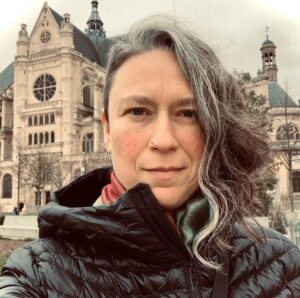New faculty Q&A: Talia Fernós discusses what mathematics teaches us about life
 Meet new Visiting Professor of Mathematics Talia Fernós and learn about her research on group theory, her teaching style, and what excites her most about teaching students.
Meet new Visiting Professor of Mathematics Talia Fernós and learn about her research on group theory, her teaching style, and what excites her most about teaching students.
Q: What is your area of research?
A: My research is, broadly speaking, in math, and specifically in group theory, which is a technical term referring to the collection of symmetries of an object. More precisely, I study the geometry of groups. What we are able to do through this study is to be able to distinguish them or say when they are equal. I might have an object that has some kinds of symmetries, and then I might have a different object. And I could ask, are those groups the same? Even though the objects may be different, are the group of symmetries of those objects actually the same, or are they different? By pulling the symmetry of the object to the symmetry of the group, we’re able to use other mathematical techniques, such as those from areas like calculus or algebra.
Q: How would you describe your teaching style?
A: I don’t know if you’re familiar with the mathematical term of an axiom, but in math, we use logic to deduce truths. The axioms are the fundamental pieces that we take for granted as an assumption that from there, we deduce theorems. The mathematician Federico Ardila and his collaborators made these axioms about teaching and learning mathematics, and they’re really beautiful. There are four of them, and the fourth one is that every student deserves to be treated with dignity and respect. Something that I try to do in my teaching is to really connect with students, listen to them, and let them be the focus of the interaction. Oftentimes, we’re lecturing because it is an efficient form of communication, but it focuses on one person saying I’m an expert, I am imparting on you my wisdom, and it’s up to you to parse what I’m saying rather than really developing relationships with the students so that they feel comfortable and confident to ask questions — that they won’t be ridiculed, no matter what the question. I focus on getting to know the students, listening to them, figuring out through their questions how I can communicate more effectively, instead of just assuming that I have perfected it and there’s nothing more I need to do. There’s always room for improvement.
Q: What excites you most about helping students learn?
A: On a fundamental level, I think mathematics education is about two things: truth and equality. I’ve realized that, for example, some students don’t understand that 0.99999 is not the same as 1. As long as I have finitely many nines, that is never equal to one. I realized that the very fundamental notion of equality is so fuzzy in many students’ minds. That, I think, has real social and even political implications. Secondly, it’s about what truth is. Of course, in the real world, there’s room for ambiguity. In math, certain things are just true or false. I think the skills and logic that allow them to evaluate equality, or lack thereof, and truth versus falsehood are two fundamental skills that I want all my students to carry away from my courses.
